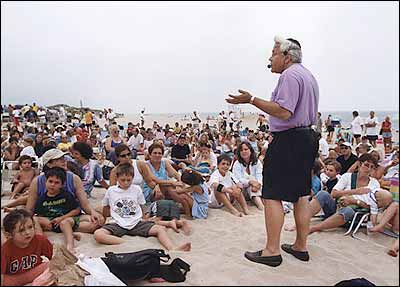
Nobody doubts that David Gelfand transformed power Judaism in the Hamptons. Since he arrived in 1998, fresh from Cleveland, he made the Jewish Center of the Hamptons the spiritual home of much of the city’s vacationing machers—from Steven Spielberg to Mort Zuckerman, Sheldon Solow to Alan Patricof (including members of the family of the owner of this magazine). The dynamic Gelfand, 54, with his monogrammed shirtsleeves, Gucci shoes, and ambitions to turn the Center into a sort of surf-side Aspen Institute, is credited with increasing membership by about 25 percent. His “Tot Shabbat” on the beach on Friday nights generally draws several hundred people, many boldfaced, and in swimwear.
But this summer, the faith and frolic (often catered by Nick and Toni’s) was overshadowed by a war over Gelfand’s leadership. His job is hanging in the balance as people who aren’t used to not having their way battle it out. On one side is the Center’s board, which includes developer Donald Zucker and lawyer Linda Heller Kamm. A majority of the board is unhappy with the chief rabbi and is investigating charges from some congregants that he mistreats underlings, may have plagiarized some of his sermons, and hasn’t accounted for questionable discrepancies in the Center’s finances. The board is refusing to renew his contract—which expires in June—until he adequately responds to their concerns.
The rabbi’s many defenders—a group that includes developer Steven Roth and shipping magnate Michael Recanati—insist the charges are mishegoss designed to push out a rabbi whose popularity has become a threat to the board’s control. Meetings are descending into shouting matches. One vastly wealthy Gelfandite e-mailed a critic: “You are a disgrace as a Jew and a human.”
The trouble started in the fall of 2004, when some on the board noticed what seemed to be unusually high staff turnover at the Center. When several board members broached the topic with Gelfand, the rabbi asked to meet face-to-face with individual board members for what he called a “healing” process. But after four such meetings this summer, Gelfand abruptly stopped them—taken aback, his defenders say, by the harshness of the allegations. “The board members were disrespectful,” says venture capitalist Leonard Gordon, a leading Gelfand supporter to whom questions were referred by the rabbi, who declined to comment. “One said, ‘You claim you don’t do mixed marriages, but in fact you do do them for money. That just shows you’re a money-grubber.’ ”
Gelfand’s critics say the board showed the utmost deference. “These people found it enormously difficult to confront their own spiritual adviser,” says Laura Hoguet, a lawyer hired by the board. “They spoke respectfully and carefully.”
In late July, the anti-Gelfand camp found something that raised questions about the rabbi’s bookkeeping. After a trip to Argentina, Gelfand submitted a copy of an expense receipt showing he’d given $1,600 to a synagogue there on behalf of the Center. But a discrepancy on the receipt led the board to call the Argentine synagogue and ask for the original. It was for $600, says Hoguet.
Gelfand’s defenders say that the Argentine synagogue subsequently sent confirmation that it had received $1,600. “The Argentinians had prepared the original receipt [showing $600] before they got all the money,” Gordon says. “The board accused a rabbi of skimming $1,000 based on a document which proved nothing.”
Things got stranger. In early August, board members say, a guard spotted a former administrative assistant leaving the Center via a fire escape. The next morning, it was discovered the intruder had accessed a computer to get congregants’ addresses. When the Center filed a criminal complaint, the assistant’s attorney told the board that she’d been acting at Gelfand’s behest, Hoguet says.
Board members raised questions about the break-in at a meeting the rabbi attended. But “he said nothing,” Hoguet says. “We think the rabbi and his supporters took the information to circulate mailings.” Gordon declines to say whether the rabbi asked the employee to get the list, but adds, “If the rabbi had sent someone in to get it, it’s not a break-in. He’s entitled to a list of his own congregants.”
Tensions boiled over at the synagogue’s annual meeting on August 21, which drew several hundred congregants. Supporters of the rabbi were raucous and shouted their demand that the board extend his contract. Now, pro-Gelfand e-mails are going out, prompting the board members to worry that he’s mounting an offensive to slur them for what they see as performing due diligence.
With the High Holidays approaching, the rabbi’s fate remains uncertain. Three Sundays ago, more than 200 Gelfand supporters gathered on the Center’s lawn. But it’s unclear whether this gesture has any weight. Board members say that the Center’s constitution gives only them the authority to extend the rabbi’s contract. “We do care what the congregation thinks,” says board member Barnet Liberman. “But it would be irresponsible of us to decide whether to extend the contract until we have answers. We won’t be railroaded.”